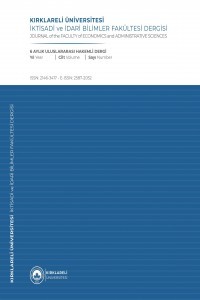Kurumsal Ahlaki Çöküntü: Yozlaşma Ve Yolsuzluk Üzerine Teorik Bir İnceleme
Kurumsal ahlaki çöküntü olarak yozlaşma ve yolsuzluğun incelendiği bu çalışmada, düşük düzeyde yolsuzluk olarak, devlet memurlarının rüşvet, görevini kötüye kullanma ve dolandırıcılık gibi faaliyetlerinin, kurumsal ve ülke düzeyinde yaygınlaşmasının yozlaşmaya neden olduğu sonucuna ulaşılmaktadır. Yolsuzluk ve yozlaşmanın ekonomik olarak etkin ve verimli bir ortama engel olduğunu ve yönetimle halk arasındaki bağı zayıflattığı gözlemlenmektedir. Adalet, eşitlik, şeffaflık ve dürüstlük gibi normatif üst değerlerin uygulanması, ülkenin ve insanlarının “orman kanunları” yerine, objektif kurallara göre yaşamasını sağlamaktadır.
Anahtar Kelimeler:
Yozlaşma, , Yolsuzluk, Politik Kutuplaşma, Ahlaki Çöküntü
Institutional Moral Hazard: A Theoretical Review On Corruption And Degeneration
In this paper, which examines corruption and degeneration as the institutional moral hazard, it is concluded that the spread of activities such as bribery, abuse of office and fraud of civil servants at the institutional and country level cause corruption at a low level. It is observed that corruption and degeneration prevent an economically efficient and productive environment and weaken the bond between the administration and the people. The implementation of normative higher values such as justice, equality, transparency and honesty ensures that the country and its people live according to objective rules instead of “jungle laws”.
Keywords:
Corruption, Degeneration, Political Polarization, Moral Hazard,
___
- AIDT Toke, DUTTA Jayasri, SENA Vania, (2008), “Governance Regimes, Corruption and Growth, s. Theory and Evidence”, Journal of Comparative Economics, Vol, s. 36, p. 195- 220. DELA RAMA Marie, 2017, “Corruption, Corporate Governance, and Building Institutions In The Asia-Pacific”, http, s.//dx.doi.org/10.1016/B978-0-08-101109-6.00007-1, erişim tarihi 23.11.2020, p. 93- 108.
- DIMAKOU Ourania, (2015), “Bureaucratic Corruption and The Dynamic Interaction Between Monetary and Fiscal Policy”, European Journal of Political Economy, Vol, s. 40, p. 57- 78.
- DU Julan, LU Yi, TAO Zhigang, (2008), “Economic Institutions and FDI Location Choice, s. Evidence From US Multinationals In China”, Journal of Comparative Economics, Vol, s. 36, p. 412- 429.
- DUVANOVA Dinissa, (2014), “Economic Regulations, Red Tape, and Bureaucratic Corruption in Post- Communist Economies”, World Development, Vol, s. 59, p. 298- 312.
- FREDRIKSSON Per G., LIST John A., MILLIMET Daniel L., (2003), “Bureaucratic Corruption, Enviromental Policy and Inbound US FDI, s. Theory and Evıdence”, Journal of Public Economics, Vol, s. 87, p. 1407- 1430.
- HARRI Ardian, ZHLLIMA Edvin, IMAMI Drini, COATNEY Kalyn T., (2020), “Effects of Subject Pool Culture and Institutional Environment on Corruption, s. Experimental Evidence From Albania”, Economic Systems, Vol, s. 44, p. 1- 18.
- JETTER Michael, PARMETER Christopher F., (2018), “Sorting Through Global Corruption Determinants, s. Institutions Education Matter- No Culture”, World Development, Vol, s. 109, p. 279- 294.
- KARAHAN, Abdulkadir (1948), “Fuzulinin Mektupları I”, İstanbul Üniversitesi Türk Dili ve Edebiyatı Dergisi, C, s. 3, S, s.4, s. 245- 266.
- McMULLAN M. (1961), “Theory of Corruption”, Sociological Review, July 1, p. 181- 201. https, s.//doi.org/10.1111/j.1467-954X.1961.tb01093.x
- MELKI Mickael, PICKERING Andrew, (2020), “Polarization and Corruption In America”, European Economic Review 124, p. 1- 23.
- MYINT U, (2000), “Corruption, s. Causes, Consequences and Cures”, Asia-Pacific Development Journal, V, s. 7, N, s. 2, p. 33- 58.
- ROBERTSON Christopher T., (2016), “Why Blinding? How Blinding? A Theory of Blinding and Its Application To Institutional Corruption”, DOI, s. 10.1016/B978-0-12-802460-7.00002-4,https, s.//www.researchgate.net/publication/303903252_Why_Blinding_How_Blinding_A_Theory_of_ Blinding_and_Its_Application_to_Institutional_Corruption (erişim tarihi, s. 15. 12. 2020), p. 25- 38.
- TESTA Cecilia, (2012), “Is Polarization Bad?”, European Economic Review, Vol, s. 56, p. 1104- 1118.
- TOWNER Nick, (2016), “How To Manage The Perfect Wave, s. Surfing Tourism Management In The Mentawai Islands, Indonesia”, Ocean and Coastal Management Vol, s. 119, p. 217- 226.
- WALSH John P., LEE You Na, TANG Li, (2019), “Pathogenic Organization In Science, s. Division of Labor and Retractions”, Research Policy, Vol, s. 48, p. 444- 461.
- WANG Bin, ZHENG Yu, (2020), “A Model of Tournament Incentives With Corruption”, Journak of Comparative Economics, Vol, s. 48, p. 182- 197.
- WANG Shuhong, ZHAO Danqing, CHEN Hanxue, (2020), “Government Corruption, Resource Misallocation, and Ecological Efficiency”, Energy Economics, Vol, s. 85, p. 1- 10.
- YAN Jia, OUM Tae Hoom, (2014), “The Effect of Government Corruption on The Efficiency of US Commercial Airports”, Journal of Urban Economics, Vol, s. 80, p. 119- 132.
- ISSN: 2146-3417
- Yayın Aralığı: Yılda 2 Sayı
- Başlangıç: 2012
- Yayıncı: Kırklareli Üniversitesi
Sayıdaki Diğer Makaleler
Investment-Driven Economic Growth in Nigeria: The Role of Oil Rent
Udi JOSHUA, Audu Ismaila AMEH, Andrew Adewale ALOLA
Avrupa Parlamentosu’ndaki Siyasi Gruplar Ve Türkiye’nin Avrupa Birliği Üyelik Süreci
Ekrem Yaşar AKÇAY, Halil Emre DENİŞ
Çin’in Covid-19’la Mücadelesi: Sağlık İpek Yolu ve Küresel Propaganda Savaşları
Kurumsal Ahlaki Çöküntü: Yozlaşma Ve Yolsuzluk Üzerine Teorik Bir İnceleme
Covid-19 Salgınının Türk Kamu Diplomasisine Etkisi
